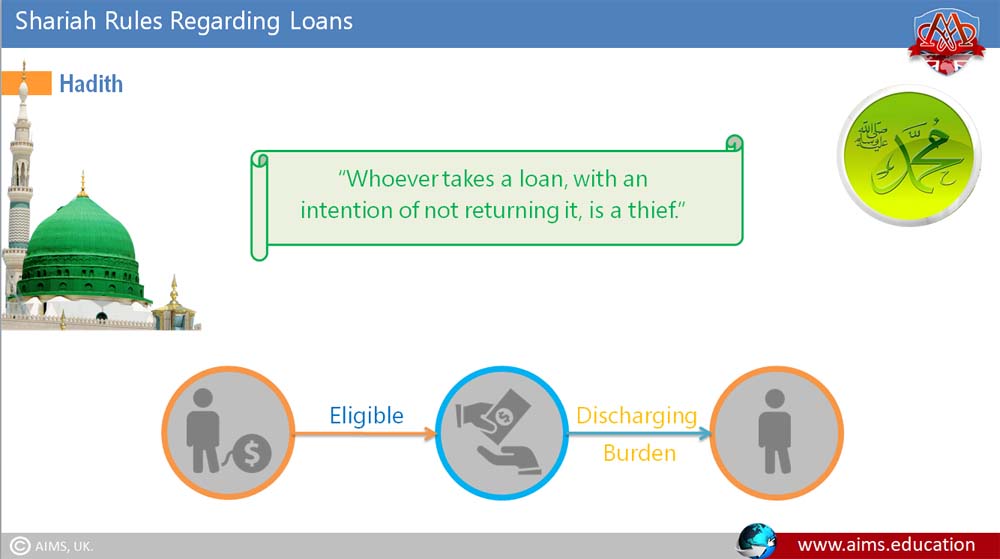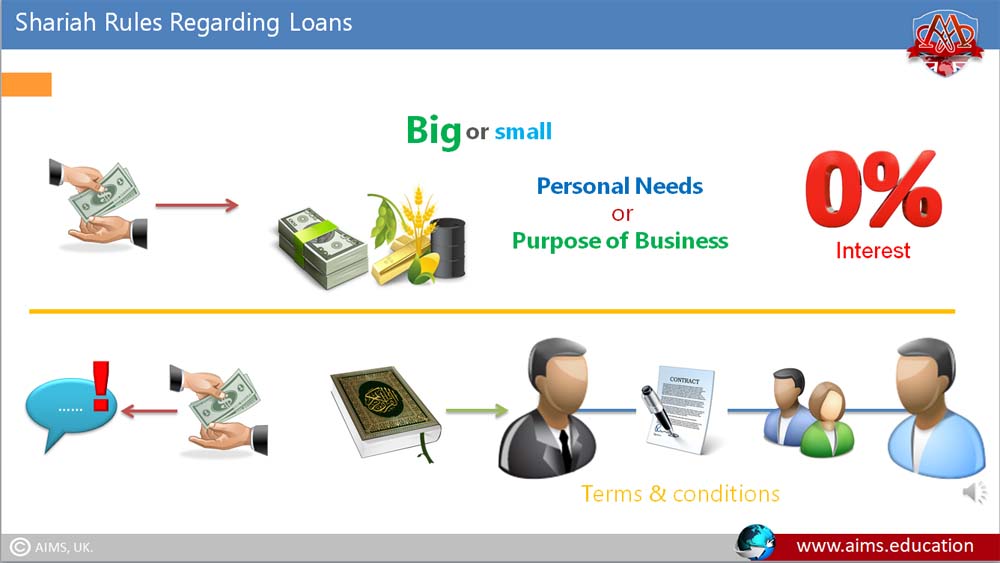What are Halal Loans?
Islamic banking is a system of banking that follows Islamic principles and guidelines. Most Muslims prefer this form of banking because it complies with the fundamental principles of Islamic law, called Shariah. Halal loans, also known as Islamic loans or Shariah compliant financing, are a form of financing that follows the guidelines of Islamic law. In simple terms, these loans do not involve the payment or acceptance of interest (Riba), as it is considered forbidden in Islam. But there is more to halal loans than just avoiding interest. As a guide on Shariah compliant loans, this document will discuss the details and nuances of this unique form of financing, and how it can benefit Muslims seeking a loan while adhering to Islamic beliefs and practices.

Key Differences Between Halal Loans and Conventional Loans
1. INTEREST:
Conventional loans typically involve the payment of interest, a practice considered usury (riba) and prohibited in Islamic law. In contrast, halal loans, being Shariah compliant, do not involve the payment of interest.
2. RISK SHARING:
In a conventional loan, the borrower bears the financial risk. If the borrower defaults, the lender can claim collateral. However, in Islamic loans, risk is shared between the lender and the borrower.
3. ASSET-BACKED:
Conventional loans can be granted for any purpose and are not necessarily backed by assets. On the other hand, Islamic loans are always asset-backed. The financial transaction must relate to a tangible asset.
4. ETHICAL INVESTING:
While conventional finance does not observe any specific ethical guidelines, Halal loans follow the principle of ethical investing. The funds are directed towards socially responsible and ethical businesses.
5. CONTRACT:
In a conventional loan, the contract is usually straightforward involving the loan amount and the interest rate. However, in a halal loan, the contract is a trading or Islamic leasing contract, where the bank buys an asset and sells or leases it to the customer.

Rules for Shariah Compliant Financing:
- The loan may be in any form that is in cash or commodity, it may be big or small, and it may be for the personal needs of the debtor or purpose of business, the Islamic loans shall be given without interest.
- Since verbal agreements regarding loans lead to disputes, the Quran has made it obligatory for both creditor and debtor to bring the contract of debt into writing in the presence of two witnesses and settle terms and conditions regarding its repayment.
- According to a Hadith, whoever takes a loan, with the intention of not returning it, is a thief.
- A debtor is eligible for Zakath, for discharging the burden of his debt.
1. Duties of Debtor:
- Islamic loans should be incurred only when it is unavoidable. It may be incurred to satisfy basic needs or to discharge an essential responsibility.
- Shariah-compliant loans should NOT be contracted for unlawful purposes or luxurious living.
- Contract of Shariah-compliant financing should be reduced in writing, in the presence of two witnesses. The debtor has the right to give dictation to the scribe when the contract of Islamic loans is being written.
- Debt should be taken with a clear intention to pay it back.
- If a creditor demands some security in the shape of property or asset, the debtor is bound to provide the same.
- Debtors should pay back the Islamic loans promptly, on the promised date, or earlier.
- The debtor is duty-bound to clear his debts, before his death. Otherwise, his legal heirs should clear the debts or Shariah-compliant loans.
2. Duties of the Creditors:
- Islamic loans should be advanced to a genuinely needy person, who requires the loan for genuine needs.
- When a creditor lends money to someone, he should make a contract in writing with the debtor, settling the terms and conditions of a Shariah-compliant loan, and the time for its return.
- If the debtor has become insolvent and is not in a position to pay back the loan, the creditor is enjoined to remit the debt. It is an act of great virtue and it carries many rewards.
- If the debtor is not able to make full payment, the creditor shall accept payment in installments.
- A creditor is allowed to use harsh words in case of a solvent debtor, who does not repay the loan despite persistent demand. But still, he is instructed not to lose his cool. He should kindly treat his debtor and should not injure the dignity of the debtor.
Role of Bait-ul-Maal in Providing Halal Loans
Designated as Bait-ul-Maal, the Public Treasury of an Islamic state plays an integral role in distributing Shariah-compliant, or halal, loans to those in need within the community. These Islamic loans are predominantly designed to enable individuals to grow their businesses using their existing capital and resources, thus removing the necessity for expansions fueled by borrowed funds. This strategy encourages moderate ambition, tempered by the sustainable use of available economic resources. However, there may be rare circumstances where the state experiences a funding shortfall and faces a dire need. In such a situation, the state may resort to borrowing. Yet, the principle of borrowing based only on necessity is firmly adhered to, with a preference for securing interest-free loans from fellow Muslim nations.

Types of Islamic Finance Loans:
Islamic banks and institutions offer a diverse array of Shariah-compliant financing opportunities, known as Islamic loans. These strategic financing options grant customers access to necessary funds, all while ensuring they avoid participating in a system of interest. Nonetheless, it’s essential to note that these loans are intended to meet basic needs, not to fund luxuries or investments. A few examples of the various forms of Shariah-compliant financing, provided by Islamic banks and other financial establishments, are outlined below.
1. Islamic Finance Home Loan:
Some Islamic banks offer a lease-to-purchase (ijarah wa iqtina) concept for home financing. They also may assist their customers in getting good deals for the real estate they may be purchasing. To finance the houses, customers may also use the Murabahah contract, Ijara Contract, or Musharaka business contract.
2. Islamic Finance Loan for Investing:
A lease-to-purchase concept for this form of Islamic loan would be employed where the bank and the customer would jointly invest in a business. With time, at a rate calculated according to the lease, the customer would pay the bank back. Another form of business financing, and a relatively more common one, is where such an institution and the customer would invest in a business together and then share the profits generated within the business.

3. Islamic Finance House Loan for Construction:
In this case, the Islamic institution or bank, and the customer may hold the right to an in-progress home together while maintaining a culture of profit and loss sharing. This form of sharing profit and loss is deep-rooted in the principles of Islamic financing and is therefore a method adopted by Islamic banks and institutions. This shariah loan option, however, has limited availability worldwide at the moment since customers are hesitant to avail of it.
4. Islamic Finance Personal Loan:
Islamic finance personal loans, a subset of Halal loans, are a powerful tool for individuals in need of funds. Instead of interest, the borrowing and lending parties engage in an asset-based transaction. Essentially, the lender purchases an asset and sells it to the borrower at a marked-up price, which the borrower repays over an agreed period.
5. Islamic Financing Student Loans:
Similarly, Islamic financing student loans allows students to finance their education without compromising their religious beliefs. These shariah-compliant financing are structured differently from conventional loans. In a typical arrangement, the financial institution might buy necessary educational services (like tuition) and then lease them to the student for a fee.

Moral Nature of Shariah Lending:
In a worldwide economy where this enthusiasm for Shariah lending is quickly growing, it is justified regardless of the exertion considering the merits and the demerits of the monetary worldview of Islamic financial matters. The leap forward of the Islamic account in the late twentieth century was no occurrence. Recent studies have evaluated an aggregate total asset of above $3 trillion coursing through the Islamic finance system. With growing rates of Shariah-compliant financing from 13 to 22%, making it the quickest developing segment in the finance industry, its significance does not appear to be any less major in the foreseeable future.
- Islamic money has yet to be praised for its moral nature, which adds to social equity as well as stipends the saving money industry a superior picture. Most importantly, Islamic fund is accepted to be a lower-risk financing component than the current ordinary.
- Then again, the substance of Islamic funds has been condemned for being somewhat wasteful and discriminatory, having no genuine included worth as far as monetary advancement or purchaser welfare.

Why Shariah Lending is Growing in Muslim and Non-Muslim Countries?
Here are the top 5 reasons why Sharia-compliant lending is on the rise in non-Muslim countries:
1. GROWTH:
The popularity and growth of Sharia-compliant lending are forecasted to grow at an unprecedented rate. Unusually high rates of growth have made it more popular and people are now looking at its authenticity and viability very closely.
2. MUSLIM DEMANDS:
The Muslim population in non-Muslim countries is ever-growing. Hence, a need for Islamic finance in those areas. The Muslim community wants to operate under the Shariah (or Muslim law) and because of that must engage in Shariah-compliant lending rather than conventional lending.
3. GLOBALIZATION:
The globalization of international markets demands that every method of finance be incorporated into the running of the market. The world is now one big marketplace and the Muslim population is one major buyer and seller. Thus to satisfy their needs and wants, non-Muslim countries are increasing their focus on Islamic finance.
4. CO-EXISTENCE:
Many non-Muslim countries believe that both Islamic finance and conventional banking can co-exist. They don’t see Islamic finance as a competition rather they see it as an opportunity to increase their customer base of which Muslims are a significant part.
5. THE GULF INFLUENCE:
Another major reason why Islamic lending is on the rise is the simple matter of fact that the Gulf States have retained their dominance over the majority of the world’s oil. The Gulf States sternly believe in trading according to the Sharia law and want Islamic finance to be incorporated into their every dealing.
Future of Shariah-Compliant Lending in Non-Muslim Countries:
All in all, Islamic lending has seen a significant rise in its use and popularity not just in Islamic countries but also in non-Muslim countries. This has been proven by London’s positive stance and increased use of Islamic finance. Historically, the Islamic banking system must be based on the gold standard of Islam, however, its practical implementation will take time. Many non-Muslims are still unaware of its existence and terms of use, but that number is slowly decreasing. All of these reasons are why Islamic finance is gaining influence and is predicted to do so at an even higher rate in the foreseeable future.
Conclusion
All these options may serve different purposes but have the laws of Islam at the heart of them. Shariah-compliant financing has also been proven to be beneficial overall for all parties involved as opposed to conventional forms of loan functioning through a culture of interest. As the demand for ethical and socially responsible financing options continues to rise, halal loans have emerged as a viable alternative that aligns with Islamic principles. And remember, knowledge is power, so do your research and make an informed decision that best suits your needs. If you are interested in deepening your understanding of Islamic finance, consider advancing your academic qualifications. AIMS offers comprehensive programs such as a doctorate degree in Islamic economics or an online MBA degree in Islamic Finance. Selecting the best institute for Islamic Finance studies can provide you with invaluable insights.
